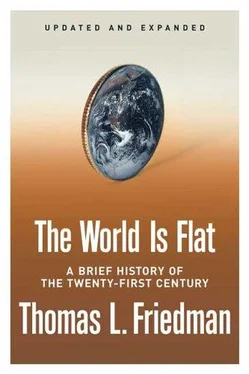“As we have begun to look to other [offshore] suppliers to do most of our manufacturing, it has become clear to us that we have to assume some responsibility for how they do that work,” explained Debra Dunn, HP's senior vice president of corporate affairs and global citizenship. First and foremost, that is what many of HP's customers want. “Customers care,” said Dunn, “and European customers lead the way in caring. And human rights groups and NGOs, who are gaining increasing global influence as trust in corporations declines, are basically saying, 'You guys have the power here. You are global companies, you can set expectations that will influence environmental practices and human rights practices in emerging markets.'”
Those voices are right, and what is more, they can use the Internet to great effect, if they want, to embarrass global corporations into compliance.
“When you have the procurement dollars that HP and McDonald's have,” said Dunn, “people really want to do business with you, so you have leverage and are in a position to set standards and [therefore] you have a responsibility to set standards.” The role of global corporations in setting standards in emerging markets is doubly important, because oftentimes local governments actually want to improve their environmental standards. They know it is important in the long run, but the pressure to create jobs and live within budget constraints is overwhelming and therefore the pressure to look the other way is overwhelming. Countries like China, noted Dunn, often actually want an outside force, like a global business coalition, to exert pressure to drive new values and standards at home that they are too weak to impose on themselves and their own bureaucrats. In The Lexus and the Olive Tree I called this form of value creation “globalution,” or revolution from beyond.
Said Dunn: “We used to say that as long as we complied with the local law, that was all we could be expected to do. But now the imbalance of power is so huge it is not practical to say that Wal-Mart or HP can do whatever they want as long as a state government or country does not stop them. The leverage HP would leave on the table would be immoral given its superior power... We have the power to transmit global governance to our universe of suppliers and employees and consumers, which is a pretty broad universe.”
Dunn noted that in a country like China there is an intense competition by local companies to become part of the HP or Dell or Wal-Mart supply chain. Even though it is high pressure, it means a steady volume of considerable business-the kind that can make or break a company. As a result, HP has huge leverage over its Chinese suppliers, and they are actually very open to having their factory standards lifted, because they know that if they get up to the standards of HP they can leverage that to get business from Dell or Sony.
Advocates of compassionate flatism need to educate consumers to the fact that their buying decisions and buying power are political. Every time you as a consumer make a decision, you are supporting a whole set of values. You are voting about the barriers and friction you want to preserve or eliminate. Progressives need to make this information more easily available to consumers, so more of them can vote the right way and support the right kind of global corporate behavior.
Marc Gunther, a senior writer for Fortune magazine and the author of Faith and Fortune: The Quiet Revolution to Reform American Business, is one of the few business writers who have recognized how global corporations can be influenced by progressive politics. “To be sure,” wrote Gunther in an essay in The Washington Post (November 14, 2004), “there are plenty of scoundrels out there, indifferent to the rights and wrongs of corporate behavior. And some executives who talk of social issues may be only mouthing the words. But the bottom line is that a growing number of companies have come to believe that moral values, broadly and liberally defined, can help drive shareholder values. And that is a case study from which everyone could learn.”
This progressive tilt of big business has not generated much press attention, Gunther noted. “Partly that's because scandal stories are juicier. Mostly it's because changes in corporate practices have been incremental-and because reporters tend to dismiss talk of corporate social responsibility as mere public relations. But chief executives of closely-watched firms like General Electric do not promise to become better global citizens unless they intend to follow through. 'If you want to be a great company today,' Jeff Immelt, GE's CEO, likes to say, 'you have to be a good company.' When I asked him why GE has begun to talk more openly about corporate citizenship, he said: 'The reason why people come to work for GE is that they want to be about something that is bigger than themselves.' As Immelt suggests, the biggest driver of corporate reform is the desire of companies to attract people who seek meaning as well as money from their work. Few of us go to our jobs every day to enhance shareholder value. Younger people, especially, want to work for companies with a mission that goes beyond the bottom line.”
In sum, we are now in a huge transition as companies are coming to understand not only their power in a flat world but also their responsibilities. Compassionate flatists believe that this is no time to be sitting on one's hands, thinking exclusively in traditional left-right, consumer-versus-company terms. Instead we should be thinking about how collaboration between consumers and companies can provide an enormous amount of protection against the worst features of the flattening of the world, without opting for classic protectionism.
“Compassionate capitalism. Think it sounds like an oxymoron? Think again,” said Gunther. “Even as America is supposedly turning conservative on social issues, big business is moving in the other direction.”
Parenting
No discussion of compassionate flatism would be complete without also discussing the need for improved parenting. Helping individuals adapt to a flat world is not only the job of governments and companies. It is also the job of parents. They too need to know in what world their kids are growing up and what it will take for them to thrive. Put simply, we need a new generation of parents ready to administer tough love: There comes a time when you've got to put away the Game Boys, turn off the television set, put away the iPod, and get your kids down to work.
The sense of entitlement, the sense that because we once dominated global commerce and geopolitics-and Olympic basketball-we always will, the sense that delayed gratification is a punishment worse than a spanking, the sense that our kids have to be swaddled in cotton wool so that nothing bad or disappointing or stressful ever happens to them at school is, quite simply, a growing cancer on American society. And if we don't start to reverse it, our kids are going to be in for a huge and socially disruptive shock from the flat world. While a different approach by politicians is necessary, it is not sufficient.
David Baltimore, the Nobel Prize-winning president of Caltech, knows what it takes to get your child ready to compete against the cream of the global crop. He told me that he is struck by the fact that almost all the students who make it to Caltech, one of the best scientific universities in the world, come from public schools, not from private schools that sometimes nurture a sense that just because you are there, you are special and entitled. “I look at the kids who come to Caltech, and they grew up in families that encouraged them to work hard and to put off a little bit of gratification for the future and to understand that they need to hone their skills to play an important role in the world,” Baltimore said. “I give parents enormous credit for this, because these kids are all coming from public schools that people are calling failures. Public education is producing these remarkable students-so it can be done. Their parents have nurtured them to make sure that they realize their potential. I think we need a revolution in this country when it comes to parenting around education.”
Читать дальше












